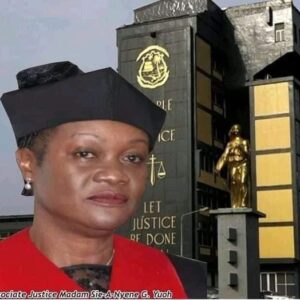PHOTO: The Author, Alphonso Nyemuh
By Alphonso G. Nyenuh
While the line of questioning during oral arguments may suggest how justices vote, that is not always the case. So let’s take a deep breath and see what the ruling of the full bench will be. There are five justices on the bench and decisions are by simple majority.
However, if the majority of justices vote along the lines of the Chief Justice’s line of questioning, I fear that they will entangle themselves in a web of contradictions, and the country in a legally avoidable crisis.
1) I fear that asking the majority to go under the gavel of Koffa while at the same time telling them that there is no “enabling statute” by which to compel them to do so, would just throw a monkey wrench of contradiction in the Supreme Court’s position.

Chief Justice Sie-A-Nyene G. Yuoh today
2) I fear that the entire legislature and the entire country would be thrown into chaos by such a ruling because the majority could simply decide not to, and they cannot be made to because, according to the Supreme Court, there is “no enabling statute” to make them to do so. And without such an enabling statute, the Executive (the branch of government charged with enforcing the law) will also have no authority upon which to seek to compel them to return to Koffa’s gavel.
3) And if they don’t return and Koffa cannot get a quorum, I fear the Senate may also be crippled in the discharge of its duties, as it relates to the passage of legislation and other matters where it is required to work in concurrence with the House.
4) And what if they don’t return to Koffa’s gavel? He would remain unable to muster a simple majority, in which case he cannot hold sessions and cannot make any decisions. And then the House would come to a standstill.
And if this happens, I’m afraid the Supreme Court would have entangled itself (and the country) in a crisis.
According to Justice YUOH’s reasoning today (buttressed by Justice Gbeisay) both sides are handicapped.
One side has the Speaker, the constitutional presiding officer but does not meet the constitutional requirement of a quorum, and therefore cannot do the business of the House. Doing the contrary will be ultra vires.
The other side meets the constitutional requirement of a quorum but does not have a constitutional presiding officer; therefore it too cannot do business of the house.
Accepting this line of reasoning as is, that both sides suffer constitutional deficiencies, which side is obligated to abandon its position to that of the other?
Therein lies a serious dilemma.
The Author is a human rights and social justice advocate and journalist. He worked previously with the Catholic Justice and Peace Commission in Liberia as Information Officer. He holds a Masters Degree in Labor and Industrial Relations from Cornell University.

